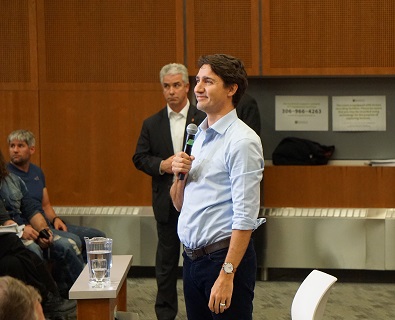Prime Minister Justin Trudeau listens to a question from a man from Cowessess. Photo by Chelsea Laskowski.
When Prime Minister Justin Trudeau was pressed on his commitment to Indigenous people at a Saskatoon stop on his cross-country speaking tour, he twice said that money alone is not the key to reconciliation.
Saskatoon Tribal Council Chief Felix Thomas was among those who had some criticism in their questions for Trudeau at the University of Saskatchewan event. Thomas said despite federal minister mandate letters indicating that Trudeau is committed to First Nations relations, the results aren’t showing.
“Obviously you think this is an important relationship, but obviously Canada doesn’t itself think it’s an important relationship because it hasn’t shown it yet: because there is a disconnect,” Thomas said.
He said since coming into power, Trudeau’s government has built positive relationships with national Indigenous organizations but relations with First Nations are not as positive.
“We’ve had some meetings with ministers. They’ve lasted about five minutes, and that’s not a nation-to-nation relationship,” Thomas said.
In Trudeau’s response, he pointed to the $8.4 billion the feds have committed over the next four years towards Indigenous funding.
“I’m impatient as well on getting this done but we also know we have to get it done right, in partnership,” Trudeau said.
He said it was necessary to listen to Elders and young people in order to empower them and close the gap between Indigenous and non-Indigenous Canadians. What he said next bothered a few people in the audience.
“I’ve spoken with a number of chiefs who say ‘yeah we need a youth centre – you want to talk about young people – we need a youth centre in our community.’ ‘Okay well what do you want in that youth centre?’ ‘You know we need TVs and lounges and sofas so they can hang around.’ And when a chief says that to me I pretty much know they haven’t talked to their young people,” Trudeau said.
He said “most” youths he speaks to would rather have canoes, paddles, and Internet access in order to do homework in a place that’s less crowded than their homes.
“We need to listen to our young people because it’s not just about throwing money at the problem,” he said.
“It’s also about demonstrating real progress on issues that have gone on far too long and that’s going to take new ways of approaching these challenges. It’s going to take learning on both sides, on the government side and the Indigenous side as we figure out how to get this right.”
Despite Thomas’s criticism, FSIN Chief Bobby Cameron had a warm welcome for Trudeau when speaking with media.
“It’s a much better work environment now than it was four years ago. So the commitment is there, the heart is there, the kindness is there. Things take a little while to get going and we understand that, and we ask our people to have patience,” Cameron said.
The status of a treaty issue on Cowessess was among the other questions asked of Trudeau.
“I come from Treaty 4 and I know we’re celebrating 150 years of Canada this year but it’s been 110 years since part of our treaty lands were taken in 1907,” one man, who identified himself as a former chief of Cowessess, asked.
In response, Trudeau acknowledged broken treaty promises as a far-reaching concern.
“Canada has not lived up to the spirit and intent of the original treaty relationships. We have failed to keep our word,” he said, listing off a number of ways in which the federal government had failed Indigenous people.
“There are fundamental injustices that continue that you can’t just snap your fingers or put down a pile of money and hope to fix.”
Trudeau said his government was committed to, and already in the process of “accelerating treaty resolution processes on outstanding claims.” broad range of them including yours
He told the man he would bring back his concerns to his ministers.
Trudeau is in Regina on Thursday to continue his cross-Canada tour.
